Searching for the best free VPN often feels like looking for a needle in a haystack. The internet is flooded with options promising total privacy for free, but the reality is often disappointing. Most of these “free” services come with a hidden price tag: your personal data being sold, laughably slow speeds, or even malware bundled with the download.
As a cybersecurity analyst at Safelyo, I’ve spent years testing these services, and I’ve seen the ugly side of “free.” Many are little more than data-harvesting operations disguised as security tools. But that doesn’t mean you have to give up. A handful of trustworthy providers stand out by offering a genuinely safe service, funded by their premium plans rather than by compromising your privacy.
This guide is the result of our hands-on testing of dozens of services to separate the genuinely safe from the dangerously deceptive. You’ll discover:
- The 5 safest free VPNs you can actually trust.
- The dangerous VPNs you must avoid at all costs.
- The real “cost” of free and how these companies make money.
- How to choose the right free service for your specific needs.
In this comprehensive guide, I will break down everything you need to know to stay protected online without spending a dime.
1. The best free VPNs in 2025: Quick picks
I get it – you’ve heard the warnings, but you just need a quick, reliable answer. If you don’t have time to read through all our detailed testing, this table is for you.
After weeks of hands-on testing where my team and I pushed these services to their limits, we’ve narrowed it down to the top contenders. Think of this as the “cheat sheet” I’d give a friend. Each VPN here has passed our non-negotiable safety and privacy checks, but they all serve very different needs.
Here’s the bottom line on the best free VPN choices for 2025.
| Rank | VPN Name | Safelyo Trust Score | Best For | Data Limit | Key Limitation |
|---|---|---|---|---|---|
| 1 | Proton VPN | 9.5 / 10 | Ultimate privacy & unlimited use | Unlimited | No streaming or torrenting support |
| 2 | PrivadoVPN | 8.5 / 10 | Watching Netflix & torrenting | 10 GB / month | Data runs out after a few movies |
| 3 | Windscribe | 8.0 / 10 | Generous data & server choice | 10–15 GB / month | Speeds can be inconsistent |
| 4 | Hide.me | 7.5 / 10 | Tech-savvy users & customer support | Unlimited* | No streaming; speed is slowed after 10GB |
| 5 | TunnelBear | 7.0 / 10 | Absolute beginners & simple tasks | 2 GB / month | The tiny data cap is a major drawback |
2. In-depth reviews: The 5 safest free VPNs we tested
After filtering out the dangerous and deceptive services, I put the top contenders through a rigorous testing process. These are the five services that truly deliver on their promises, each with its own unique strengths.
2.1. #1 – Proton VPN: Best overall for unlimited data and privacy
Overall Rating:
9.5 / 10
Provider:
Proton AG
Headquarters/Jurisdiction:
Geneva, Switzerland
Servers and Countries:
100+ servers in 3 countries
Proton VPN is, without a doubt, the safest free VPN on the market. It’s built by the same team behind Proton Mail, a company with a long-standing commitment to privacy. When I use Proton VPN, I have complete confidence that my connection is secure and my data is private.
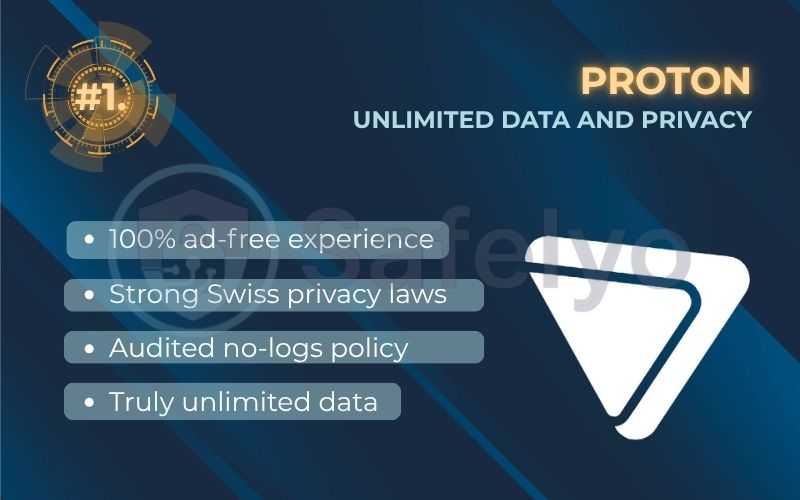
It sacrifices entertainment features for rock-solid security, a trade-off I believe is well worth it. The user interface is refreshingly simple – no confusing settings, just a big “Quick Connect” button that gets the job done.
| Pros | Cons |
| Truly unlimited dataAudited no-logs policy Strong Swiss privacy laws 100% ad-free experience | Speeds can be slow during peak hours Limited to 3 server countries No streaming or P2P support Only one connection at a time |
This is for the privacy purist. If you’re a journalist, an activist, or simply someone who believes online privacy is a fundamental right, Proton VPN is your best choice. It’s also perfect for students or anyone who needs to use a VPN daily without worrying about hitting a data limit.
What I like:
- Truly unlimited data. This is its superpower. You can leave it on all day, every day. I used it for a full week of browsing, emailing, and research without a single issue.
- Ironclad privacy policy. Proton has a strict, independently audited no-logs policy. They simply don’t track what you do online.
- Based in Switzerland. This is a huge plus. Switzerland has some of the world’s strongest privacy laws, meaning no one can force Proton to hand over user data.
- Completely ad-free. The app is clean and focused on one thing: Your security.
What I don't like:
- Slower speeds at peak times. As free users are on more crowded servers, I noticed some slowdown during busy hours. It’s fine for browsing, but not for heavy-duty tasks.
- Only one device at a time. You’ll have to log out on your laptop to use it on your phone.
- Limited server choice. You get access to servers in three countries: the United States, the Netherlands, and Japan.
- No streaming or P2P support. Don’t expect to unblock Netflix or download torrents with the free version.
2.2. #2 – PrivadoVPN: Best free VPN for streaming and P2P
Overall Rating:
8.5 / 10
Provider:
PrivadoVPN
Headquarters/Jurisdiction:
Zug, Switzerland
Servers and Countries:
12 servers in 10 countries
PrivadoVPN is a fantastic choice for specific tasks. It’s the “special occasion” VPN I’d recommend to a friend who wants to catch a specific show. It proves that you don’t always have to pay to get past geo-blocks, but the strict data cap means you have to use it wisely. Think of it as a movie ticket, not an all-access pass.
| Pros | Cons |
| Successfully unblocks US NetflixP2P torrenting is fully supported Solid Swiss privacy protection Good connection speeds | 10GB monthly data limitSpeeds can be inconsistent Only one device connection |
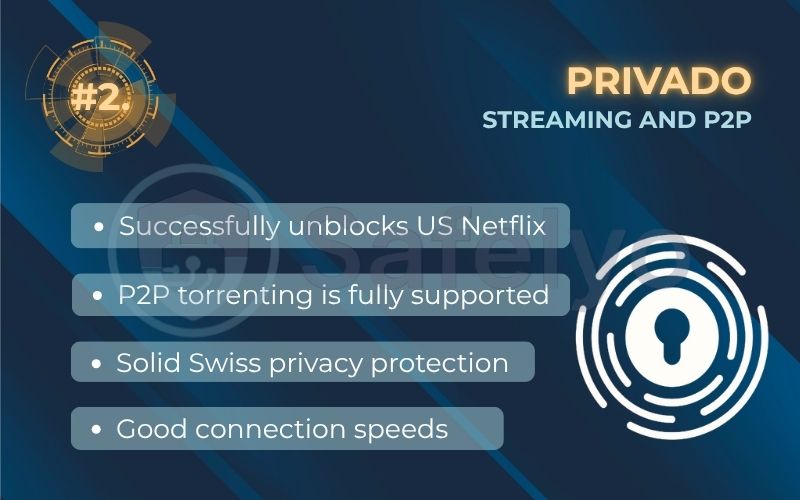
This is for the entertainment seeker on a budget. If you want to watch a movie on US Netflix or securely download a large file once in a while without paying for a subscription, this is your go-to.
What I like:
- Unblocks streaming sites. This is a huge win for a free service. In my tests, I was genuinely surprised when PrivadoVPN successfully unblocked Netflix US and Hulu on its free servers. I could stream an entire episode of a US-exclusive show with only minimal buffering at the start.
- Allows P2P on all free servers. If you use torrents, you know how important this is. PrivadoVPN doesn’t restrict P2P traffic, which is rare for free plans.
- Good speeds. I found that because they manage their server loads well, the speeds were more than fast enough for streaming in HD.
What I don't like:
- 10GB monthly data limit. This is the biggest catch. That 10GB is enough for maybe 3-4 movies in HD on Netflix. If you use it for daily browsing, it will run out fast.
- Only one device at a time. Like Proton, I could only protect one device at once.
2.3. #3 – Windscribe: Best for generous data allowance and server locations
Overall Rating:
8.0 / 10
Provider:
Windscribe Limited
Headquarters/Jurisdiction:
Ontario, Canada
Servers and Countries:
Servers in 11 countries
Windscribe is a powerful and generous free VPN. It doesn’t excel in one single area like Proton (privacy) or PrivadoVPN (streaming), but it offers a solid, well-rounded package. It’s the Swiss Army knife of free VPNs – versatile and useful for a wide range of everyday tasks.
| Pros | Cons |
| Generous 10-15GB monthly data Servers in 11 countries R.O.B.E.R.T. ad and malware blocker Allows unlimited device connections | Inconsistent connection speeds Unreliable for unblocking streaming sites The interface can be complex for beginners |
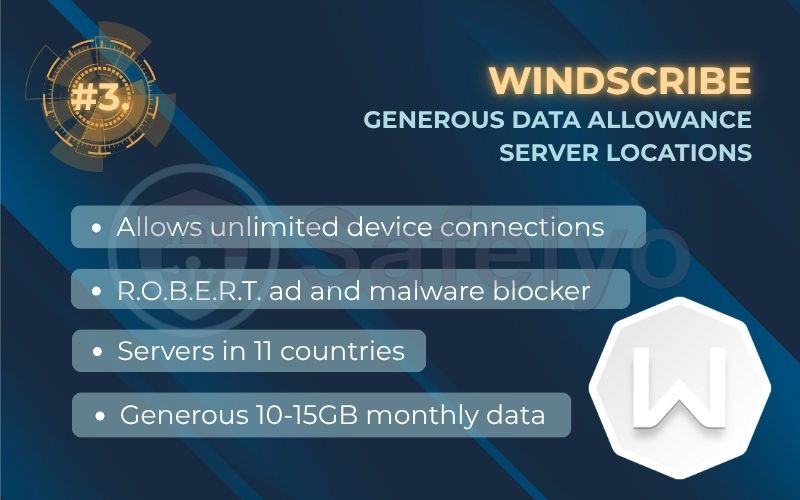
This is the flexible all-rounder. It’s great for people who browse a lot and want more choice in where their connection appears to be coming from, without the ultra-strict limits of other services.
What I like:
- Generous data cap. You start with 10GB a month, which is already good. But I tested their offer to get 15GB by simply tweeting about them, and it worked instantly. That’s a clever bonus.
- Servers in over 10 countries. This is a major step up from Proton’s three locations, giving you more options to find a fast server or bypass local restrictions.
- Useful R.O.B.E.R.T. feature. This is their custom tool that blocks ads, trackers, and malware sites. I found it worked quite well, making ad-heavy news websites much cleaner to read.
What I don't like:
- Inconsistent speeds. While testing, some days my connection felt snappy, but on other days, especially on the UK server, it felt sluggish.
- The interface can be busy. For a brand-new user, the app has a lot of options and stats, which can be a bit overwhelming compared to TunnelBear or Proton.
- Unreliable for streaming. I wouldn’t count on it for unblocking Netflix; it’s very hit-or-miss.
2.4. #4 – Hide.me: Best for configurability and customer support
Overall Rating:
7.5 / 10
Provider:
eVenture Ltd.
Headquarters/Jurisdiction:
Labuan, Malaysia
Servers and Countries:
Servers in 8 locations
Hide.me prioritizes security and support over everything else. It’s not the VPN for entertainment, but it’s a solid, trustworthy choice if you want technical control and the reassurance that an expert is always on hand to help you out, even on the free plan.
| Pros | Cons |
| Unlimited data (throttled after 10GB) 24/7 live chat support for free users Highly customizable security settings Strong no-logs policy | Does not unblock streaming services Speeds are very slow after the 10GB cap Interface feels a bit dated |
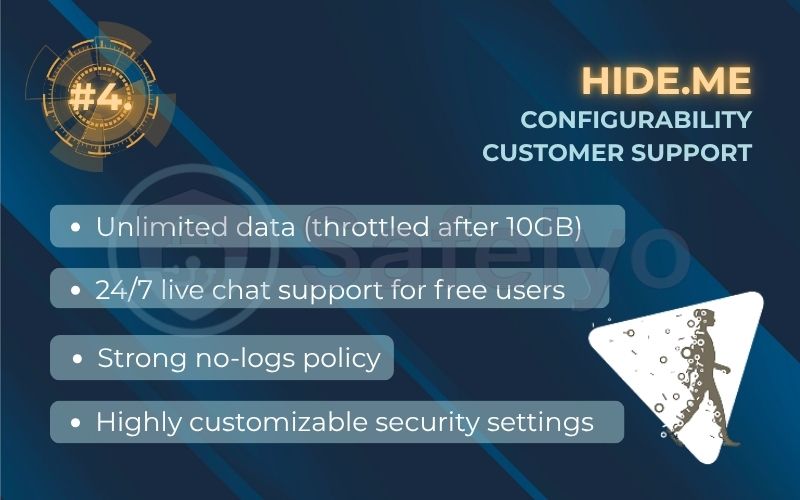
This one is for the tech-savvy user or the person who values good customer service. If you like to tinker with settings and want the peace of mind of knowing help is available 24/7, Hide.me is a strong contender.
What I like:
- Unlimited data (with a catch). You get 10GB of high-speed data per month. After that, you can still use it with unlimited data, but your speed is throttled. It’s like going from a highway down to a quiet neighborhood street – I was still moving, but much slower.
- 24/7 live chat support. This is its most impressive feature. To test this, I started a live chat at 2 AM with a technical question and got a helpful response from a real person in under a minute. This level of support for free users is almost unheard of.
- Highly configurable. It allows you to choose between different VPN protocols and customize your connection, which I, as a power user, appreciate.
What I don't like:
- Almost no streaming support. It was blocked by every major streaming platform I tested.
- Only 8 server locations. The selection is quite limited compared to Windscribe.
- The app isn’t the most intuitive. It feels a bit clunky and less user-friendly than its competitors.
2.5. #5 – TunnelBear: Best for ease of use and beginners
Overall Rating:
7.0 / 10
Provider:
TunnelBear (McAfee)
Headquarters/Jurisdiction:
Toronto, Canada
Servers and Countries:
Servers in 47+ countries
TunnelBear is a beautifully designed and secure VPN that is hamstrung by its tiny data allowance. I’d recommend it to anyone as a way to learn about VPNs without any risk or confusion. It’s a fantastic educational tool, but for any practical, day-to-day purpose, you’ll hit that data wall almost immediately.
| Pros | Cons |
| Extremely easy and fun to use Access to the full 47+ country network Annual independent security audits Cute bear-themed interface | Very low 2GB monthly data cap Not suitable for streaming or torrenting Speeds can be average |
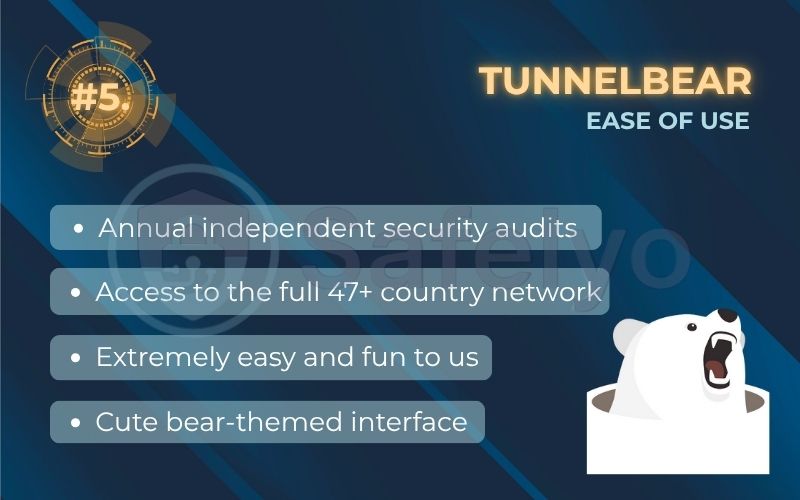
This is the perfect “my first VPN.” If you’re completely new to VPNs and want to understand how they work, or if you just need to secure your connection for five minutes at a coffee shop, TunnelBear is for you.
What I like:
- Incredibly user-friendly. The first time I opened the app, I smiled. An animated bear literally “tunnels” across a world map to your chosen server location. It turns a complex technical process into something fun and intuitive.
- Regular independent security audits. TunnelBear takes its security seriously and proves it by having outside experts check its systems every year.
- Access to the full server network. Unlike others, you can connect to any of TunnelBear’s servers in 47+ countries, even on the free plan.
What I don't like:
A cripplingly low 2GB data cap. This is the fatal flaw. 2GB per month is barely enough to check email and read a few news articles. When I tested it, it was completely gone after watching about one hour of standard-definition YouTube. It resets monthly, but it’s just not enough for any regular use.
3. The dangers of most free VPNs: What’s the real cost?
There’s a classic saying in the tech world that holds especially true for VPNs: if you’re not paying for the product, you are the product. While the idea of getting top-tier protection for free is appealing, the business model of most free VPNs relies on monetizing you in ways that can seriously compromise your privacy and security.
Here’s the real price you often pay for “free”:
Logging and selling your data.
This is the most common and dangerous catch. The big question is, do free VPNs sell your data? For many, the answer is a resounding yes. They track your browsing habits, the websites you visit, and your connection times, then package this information and sell it to data brokers, advertisers, and other third parties. Your private data becomes their primary source of revenue.
Weak security and data leaks.
To cut costs, many free providers use outdated encryption protocols that paid services abandoned years ago. Worse, they often lack essential security features like an automatic kill switch – a function that instantly cuts your internet if the VPN connection drops, preventing your real IP address from being exposed.
Malware and intrusive ads.
Some of the most popular free VPNs have been found to be riddled with malware in independent studies. Others don’t just show ads within their app; they actively inject intrusive pop-ups and banner ads into your web browser, creating a frustrating and potentially unsafe browsing experience.
Severe limitations.
Even the safer free VPNs have to impose strict limits to encourage you to upgrade. This usually means tiny monthly data caps (sometimes as low as 500MB), painfully slow speeds due to overcrowded servers, and a choice of only two or three server locations.
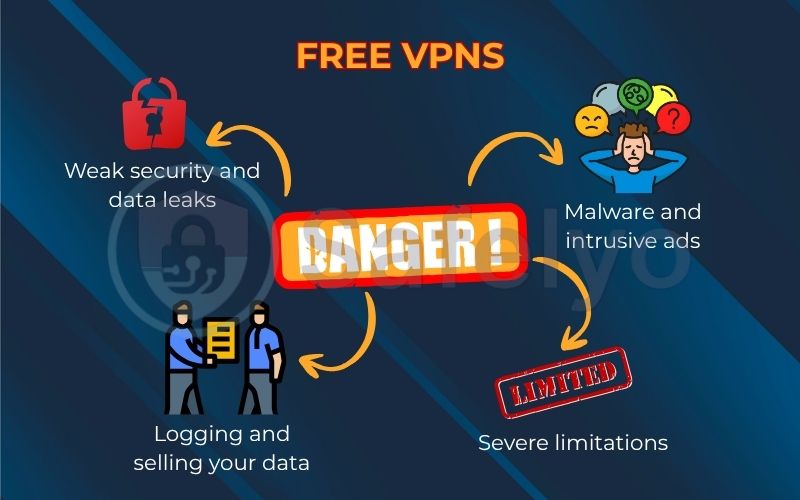
A few years ago, I was testing a free VPN that had millions of downloads and glowing app store reviews. On the surface, it worked fine. But a background check revealed its parent company had a documented history of privacy violations and was based in a country known for data surveillance. This is the kind of risk that doesn’t show up in a simple speed test, and it’s exactly why our vetting process at Safelyo goes so deep.
4. How we test and rank the best free VPNs at Safelyo
Not all “best of” lists are created equal. Here at Safelyo, we don’t just rely on marketing claims or app store ratings. Our recommendations are built on a foundation of independent, hands-on testing. My team and I have a simple rule: we will never recommend a product we haven’t used and vetted ourselves.
Our methodology is designed to answer one question: Is this VPN truly safe and usable for a regular person? Here’s a look under the hood at our core testing criteria.
4.1. Privacy policy and logging
This is the first and most important hurdle. Before I even install a VPN, I read its privacy policy from top to bottom. I’m looking for a clear and unambiguous no-logs policy. Think of it this way: a good VPN is like a conversation that nobody writes down. A bad one keeps a detailed diary of everything you do and sells it. We give top marks to services like Proton VPN that have their no-logs claims verified by independent, third-party audits.
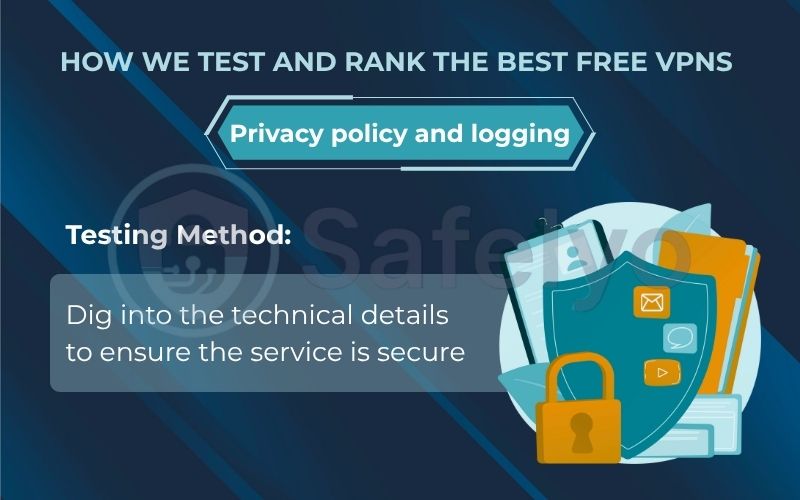
4.2. Security and leak tests
A privacy policy is a promise; strong security is the lock that backs it up. We dig into the technical details to ensure the service is secure.
- Encryption: We only approve VPNs that use AES-256 encryption, the same standard trusted by banks and militaries worldwide. Anything less is a non-starter.
- Kill Switch: I consider this a non-negotiable feature. A kill switch is your digital bodyguard; if your VPN connection accidentally drops, it instantly blocks your internet access to prevent your real location (IP address) from being exposed.
- Leak Tests: We use specialized tools to actively check for IP, DNS, and WebRTC leaks. In simple terms, we’re trying to poke holes in the VPN’s armor to see if any of your real data leaks out. A VPN that leaks is worse than no VPN at all.
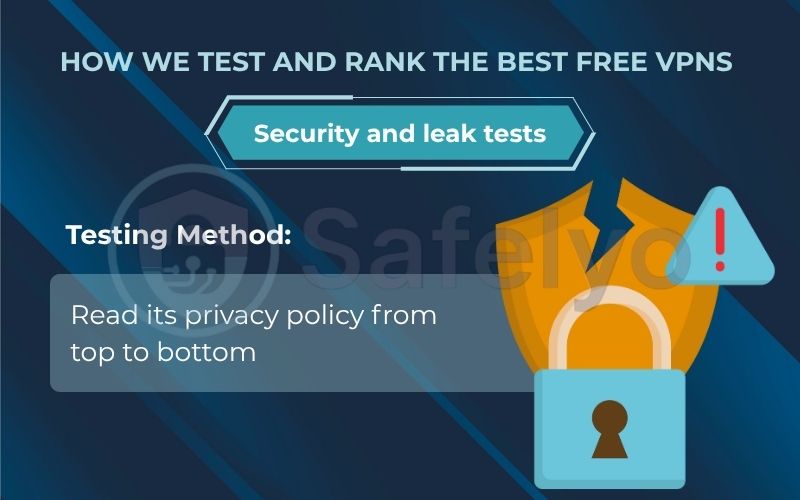
4.3. Speed and performance
A VPN that makes your internet unusable is a VPN you won’t use. I measure connection speeds (download, upload, and ping) across various servers at different times of the day. A VPN might be fast on a Tuesday morning but crawl to a halt on a Friday night when free servers are packed. We test repeatedly to get a realistic picture of the average performance you can expect.
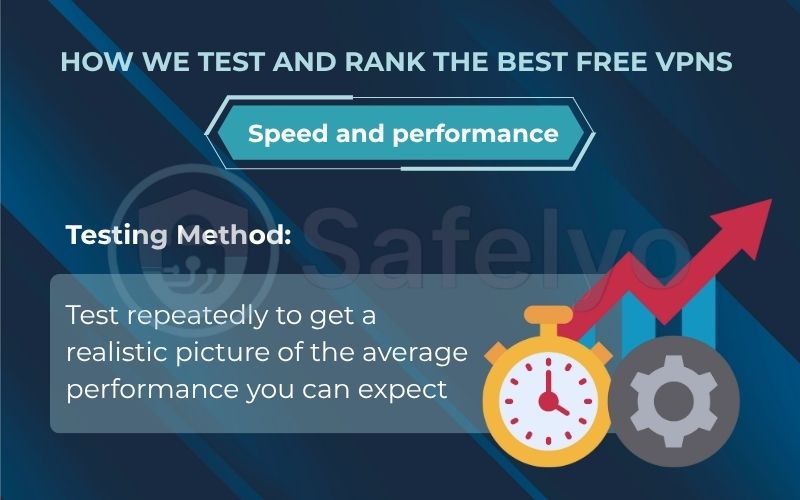
4.4. Data limitations and features
This is where we evaluate the “catch.” Free services have to have limits, but some are fair while others are dealbreakers. We analyze:
- Data Caps: How much data do you actually get? Is it a generous 10GB, or a barely usable 2GB?
- Server Network: How many countries can you connect to? More options mean a better chance of finding a fast, uncongested server.
- Feature Restrictions: We check if they block P2P traffic for torrenting or if they are able to unblock any streaming services. We assess if the free plan is genuinely useful or just a frustrating advertisement for the paid version.
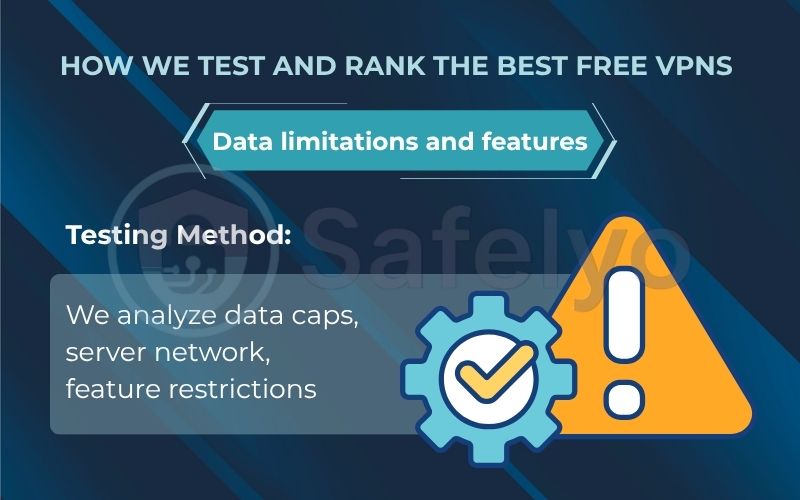
5. Free VPNs to avoid at all costs
While the VPNs we’ve recommended have passed our safety checks, the app store is a minefield of dangerous options. Some of the most popular free VPNs are not just ineffective; they are actively harmful to your privacy. This isn’t just a warning – it’s a plea to protect your personal information.
Based on my research and findings from cybersecurity reports, here are a few well-known services you should never install:
- Hola VPN: This is arguably the most dangerous service disguised as a VPN. Hola VPN operates as a peer-to-peer (P2P) network. This means when you use it, you’re not connecting to a secure server; you’re using another person’s internet connection. In return, someone else – a total stranger – could be using your internet connection to do who-knows-what. It essentially turns your computer into an exit point for others, which could make you responsible for their online activities.
- Betternet: Despite its friendly name, Betternet’s history is troubling. A landmark study by Australia’s CSIRO found its Android app to contain a high number of tracking libraries and even malware. Its parent company, Aura, has also been associated with privacy-unfriendly practices. Their business model has historically relied on collecting user data for advertising.
- Turbo VPN, SuperVPN, Thunder VPN: I’m grouping these together because they share similar red flags. They are all wildly popular, have millions of downloads, and are often owned by or have ties to companies based in China, a jurisdiction with no privacy protection for users. Many of these services have vague privacy policies, have been caught leaking user data, and are filled with invasive ad trackers. Their main purpose seems to be data collection, not data protection.
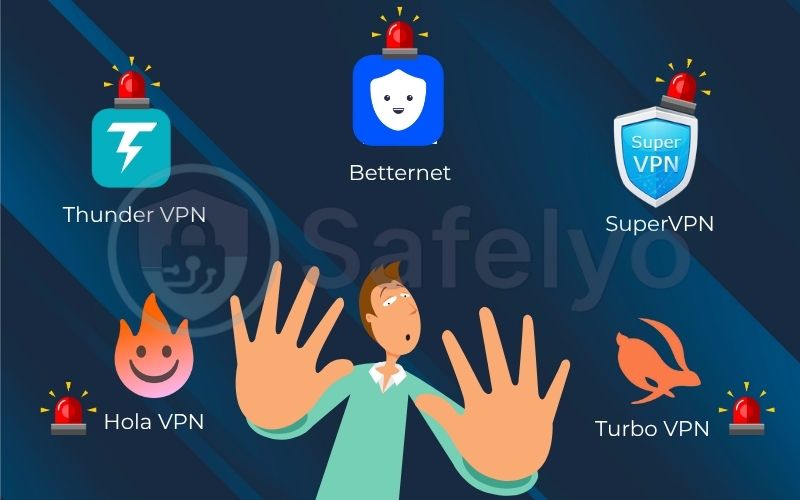
Think of it this way: Using a trustworthy VPN is like hiring a professional bodyguard. Using one of these is like asking a known pickpocket to watch your wallet. The risk is simply not worth it.
6. The almost free alternative: Why a $2 VPN beats any free option
We’ve shown you the best of what “free” has to offer. But what if I told you that for the price of a single cup of coffee per month, you could eliminate every single limitation we’ve discussed?
After years of testing, I can confidently say that the gap between the best free VPN and a top-tier cheap VPN isn’t a small step – it’s a giant leap. For around $2 – $3, you move from a world of restrictions to a world of complete online freedom.
Let’s put it in black and white. Here’s a direct comparison between our top free pick, Proton VPN, and a typical top-rated cheap VPN like Surfshark or CyberGhost.
| Feature | Best Free VPN (Proton VPN) | Top Cheap VPN (e.g., Surfshark) |
| Data Limit | Unlimited (but slow) | Truly Unlimited |
| Speed | Medium, can be slow | Very Fast (10Gbps+ servers) |
| Server Network | 3 Countries | 100+ Countries |
| Streaming | No | Yes, unblocks 20+ Netflix libraries |
| Simultaneous Connections | 1 Device | Unlimited Devices |
| P2P/Torrenting | No | Yes, fully supported & optimized |
| Ad Blocker | No | Yes, built-in |
| Monthly Cost | $0 | ~$2.50 |
The choice becomes clear. While a free VPN is excellent for basic protection and occasional use, it’s like trying to travel the world on a scooter. It works, but it’s slow, limited, and not very comfortable. A cheap paid VPN is like buying a plane ticket – it gets you anywhere you want to go, quickly and securely.
If you find yourself constantly worrying about data caps, slow speeds, or being blocked from your favorite shows, making this small investment is the single best upgrade you can make for your digital life.
>> Ready to see what premium feels like? Check out Safelyo’s expert guide to the best cheap VPNs to find a top-tier service that fits your budget.
7. FAQ about the best free VPN
I get a lot of questions about free VPNs, and many of them revolve around the same core concerns about safety and limitations. Here are the direct answers to the most common queries I receive.
What is the actual best free VPN?
For overall privacy and daily use, Proton VPN is the best free VPN. It’s the only service from our tests that offers unlimited data with a strict, audited no-logs policy, all backed by Swiss privacy laws. However, if your main goal is to watch Netflix, PrivadoVPN is the better choice, despite its 10GB data limit.
Are free VPNs really safe?
A select few are safe, but most are not. Reputable providers like Proton VPN and Windscribe are safe because their business model is to convince you to upgrade to their paid plan, not to sell your data. However, the vast majority of free VPNs found in app stores are dangerous and may log your activity, contain malware, or leak your data. Always choose one that has been independently verified.
Is there a 100% free VPN?
Yes, services like Proton VPN offer a 100% free plan that you can use forever without paying. The “catch” is that these free plans always come with limitations – such as fewer server locations, slower speeds, and blocked features like streaming – to encourage you to upgrade to their paid versions.
Is ProtonVPN a 100% free VPN?
Yes, Proton VPN has a genuinely free version that doesn’t cost anything and provides unlimited data for browsing. You don’t need to provide any payment details to sign up. Its limitations are purely functional (speed, servers, features), not financial.
What is the best free VPN for Netflix?
PrivadoVPN is currently the best free VPN for Netflix. During our tests, it consistently unblocked the US Netflix library. The main drawback is its 10GB monthly data limit, which is enough for only a few hours of HD streaming per month.
What’s the difference between a free VPN vs a paid VPN?
The main differences are performance, features, and security guarantees. Paid VPNs offer unlimited data, much faster speeds, thousands of servers worldwide, the ability to unblock streaming sites, and advanced security features. Free VPNs are always limited in one or more of these areas and often come with privacy risks if you choose the wrong provider.
8. Conclusion
Choosing the best free VPN requires a careful balance between cost-saving and digital safety. While the landscape is filled with potential risks, our in-depth testing shows that a few trustworthy services can provide essential protection for basic needs without costing you a cent. The key is to know what you’re getting into and to pick a provider with a transparent business model.
To sum up, here are the key takeaways to remember:
- Proton VPN is the top choice for unlimited data and unmatched privacy.
- PrivadoVPN is your best bet for occasional streaming if you can stay within the 10GB data limit.
- Always avoid VPNs with shady histories, like Hola VPN or those with unclear ownership. Your privacy is the price you pay.
- A cheap paid VPN is almost always a superior investment, removing all limitations for just a couple of dollars a month.
Ultimately, your online security is one of the most important investments you can make. A reliable VPN is your first and most critical line of defense on the internet. For users who demand more power, speed, and unrestricted access to global content, Safelyo recommends exploring our comprehensive guide to the best VPN services to find the perfect premium solution for your needs.


